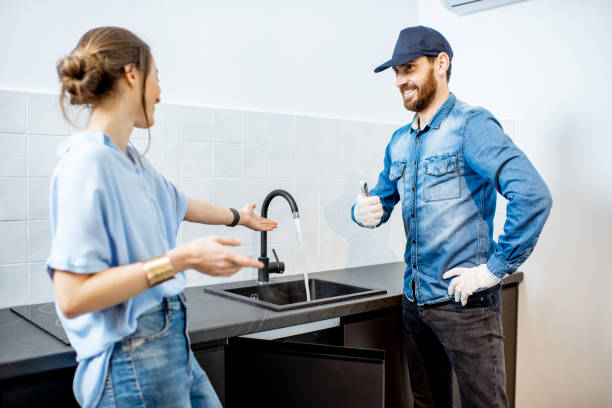
Plumbing problems in your home can be a real headache, and when dealing with those issues, the last thing you need is a plumber who will compound your problems. But that is exactly what you will get if you don’t do your due diligence before hiring a plumber, says RENTit Colorado.
With so many unqualified and dishonest plumbers out there, trying to separate unsuspecting homeowners from their hard-earned cash, how do you avoid becoming one of their victims? Before hiring a plumber, get clarity on the following questions.
8 questions to ask a plumber before they begin work
What is your location?
You can find out the plumber’s location from their website or social media pages. The reason for adding this question is to remind you of the importance of working with a local plumber. National plumbing brands may not be as detailed as smaller local companies. Also, it is easier to spot a fly-by-night operation when you insist on working with local plumbers only. A plumber who is not local will struggle to answer the rest of the questions on this list.
Are you duly certified and licensed to work in this location?
Local government licensing processes involve a review of a plumber’s training and certifications. If the plumber has the necessary documents to work in your area, they will be happy to share them. This information will often be displayed on their website and in their offices. The plumber should be a recognized member of their local professional body. Partnerships with important suppliers are a plus.
How long have you been in this locality?
This helps verify the trustworthiness of a plumber. If a plumber has been in business in the same area for a long time, they can usually be trusted. If he is incompetent or tardy, it won’t be hard to find at least one neighbor, relative, friend, or colleague who will have bad things to say about the plumber. This is one of the reasons why you should limit yourself to only local plumbers.
Do you have references I can call?
It is not enough to ask a plumber for their references; they must agree to let you contact these people. Additionally, the references should be those in your area whom you can visit, if it becomes necessary. If the plumber you are talking to is not a local brand, getting them to provide local references can be difficult. After a plumber provides the details of their past and present customers, it is your job to call those people to verify the plumber’s claims.
What is your area of specialization?
If you are looking for a plumber to help you solve the issues in your private residence, do not hire a commercial plumber. If you live in a single-family home, do not hire a plumber who predominantly works with apartment buildings. If trying to fix a septic tank, ensure the plumber has extensive experience in septic system installation, repair, and maintenance. The plumber’s skill and experience should match perfectly with the specific plumbing issues you are trying to resolve.
What kind of insurance do you have?
For your own peace of mind, do not hire a plumber unless they are adequately insured. The plumber must have the following types of policies; workers’ compensation, liability insurance, and property insurance. Also, if a plumber is bonded, it provides an extra layer of security. That’s because a bonded plumber offers protection from financial losses in case they fail to complete the work as agreed in the contract.
Do you guarantee your work?
If a plumber guarantees their work and something goes wrong shortly after they complete the job, they will fix the problem at no cost to you. If the plumber is willing to guarantee their work, it is a sign that they are ready to do quality work. At the same time, some plumbers will tell you that their work is guaranteed, but will decline to write this into the contract. If a plumber is unwilling to give you an express warranty but insists on an implied warranty, you should not trust them.
Is your estimate firm, and how do you charge for your work?
If the estimate is informational, it could change significantly when the project begins. That is why you want to get a detailed written estimate, with labor and material costs spelled out. You also want to know how the plumber bills for their work. Will they charge you a percentage of the total cost or a fixed amount? Also, find out when the plumber expects you to pay them. Never agree to pay a plumber up front. Lastly, is every detail included in a written contract?
Ideally, when following this process, you should be talking to two or three plumbers. Also, for obvious reasons, you don’t want to do this when you have a plumbing emergency in your home. You will not be in the right frame of mind to screen the plumber thoroughly.

